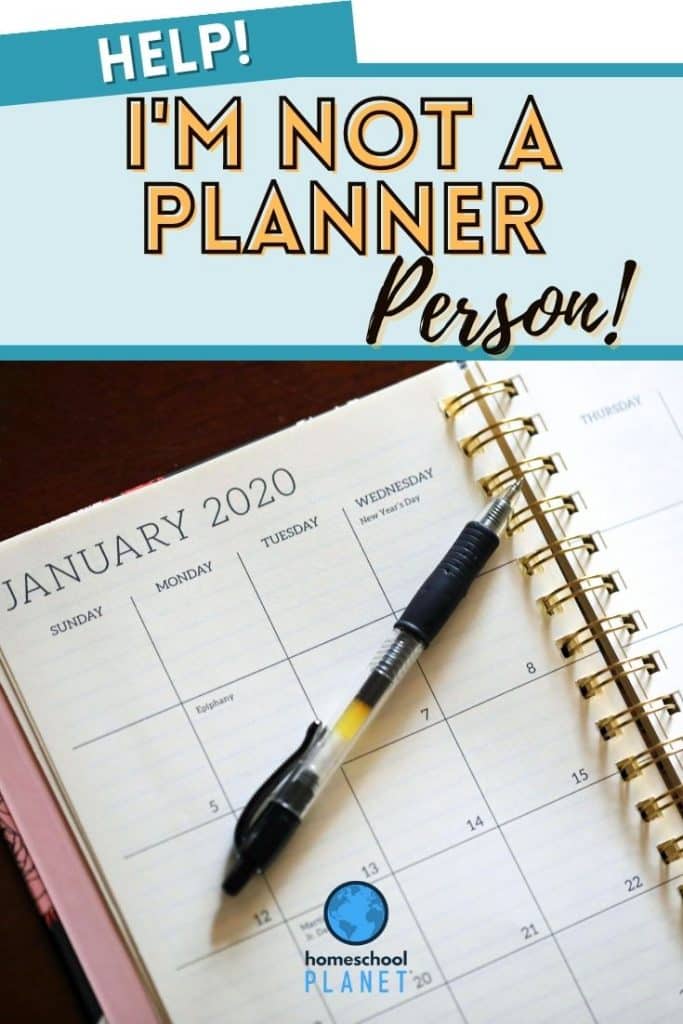Help! I’m Not A Planner Person (but I homeschool!)
There’s a common misconception in the homeschool world that to homeschool, you must be uber-organized. People picture color-coding, a complex file system, and of course, a giant wall calendar that (somehow) holds your whole family together.
But not all of us are natural planners, and that’s OK. There are other approaches and tools you can use when you weren’t born with Marie Kondo-level skills.

Homeschool Planning When You Are Not A Planner Person
One of the many benefits of homeschooling is that it’s so flexible. That means that you don’t have to plan your homeschool any one way.
In fact, here’s a secret that long-time homeschoolers know: the best system is the one you use. It doesn’t have to look like what your friend uses; you don’t have to use the same setup as your sister or the lady at co-op.
Maybe you’ve tried a ton of planners and none of them have lasted more than a few weeks. (Been there!)
Perhaps it’s time for a mindset shift, from forcing yourself into a planning system, to asking yourself – what are my actual goals?
Tips To Help With Planning, Even If You Are Not A Planner Person
If planners have started giving you hives, there are a few things you can do to make sure you still get things done:
Set goals and priorities.
Even if you don’t like to plan every detail of your day, it’s still important to have a big picture idea of what you want to accomplish. This will help you stay focused and avoid getting sidetracked.
The best homeschooling goals are:
- Specific
- Individualized to the child
- Measurable
- Reasonable
- and if possible, take into account your child’s interests
One way to set goals with bigger kids is to work on them together. Kids as young as 7 or 8 can share what they want to learn about, and what skills they want to work on.
You can keep track of goals in a notebook, the notes app on your phone or create lists in the Homeschool Planet online planner.
You can also decide when you want to check in on goals and schedule a reminder for every 6 weeks, each quarter or once or twice a year.
Create a to-do list.
A to-do list is a great way to keep track of what you need to do and when it needs to be done.
You can also use your to-do list to prioritize your tasks.
If you don’t know where to start, begin with a “brain-dump,” writing down everything that’s spinning in your brain. Use a large sheet of paper and allow this to be messy.
Then, consider the Eisenhower Method (also called the Eisenhower Matrix). This tool helps you divide tasks based on urgency and importance.
So if something is urgent and important – your pup is noticeably “under the weather” – you’ll probably want to call the vet, or at least keep a close eye on your dog and your rugs.
But if you wrote down that you need to buy a birthday present for your nephew who is turning 10 next month, that isn’t urgent. It is still important, though.
From there you can create separate lists of:
- things that need to happen right away, like pick up dog medicine
- things need to happen fairly soon – ask your sister what your nephew would like for his birthday
- things that need to get done, but maybe not by you – can someone else pick up cat food?
- and things that maybe keep bugging you, but really aren’t urgent or important, i.e., taking down the funky bathroom wallpaper. (No one will actually suffer if this waits 6 months or more.)
If you’re worried that things will fall through the cracks if you don’t do them RIGHT NOW, try keeping to-do lists in a safe place (hang them on the wall, keep them in a special notebook, or keep lists in the Homeschool Planet platform).
Then make a plan to check in regularly. Schedule a time once a week to check back and adjust your lists as needed.
Be flexible.
Things don’t always go according to plan, so it’s important to be flexible and adaptable. If something unexpected comes up, be willing to change your plans accordingly.
This is one of the many benefits of The Homeschool Planet platform – you can easily reschedule single assignments or whole days, because we know sometimes combining school and life doesn’t look like “The Plan.”
This happens to everyone – it’s not just you, and the key is to not dwell on being “behind.” Use your energy instead to move to what’s next when life calms down a bit.
(You can do that when you know that things are safely waiting for you!)
Delegate tasks.
If you have too much on your plate, don’t be afraid to delegate tasks to others. This will free up your time so you can focus on the things that are most important to you.
Did you know that through Homeschool Planet, you can send lists and notes to family members?
So that means your partner, or even your older kids can pick up a task and instantly have all the information they need.
Online Homeschool Planning Makes It Easy!
Homeschool Planet has functionality that can help with all of the above tips – from the ability to make lists and notes, to automatic rescheduling when life stuff happens, to helping you send an email or note without even leaving your planner.
Imagine how helpful it would be to easily:
- set goals for each child
- set reminders to check back regularly on those goals
- create prioritized to-do lists
- schedule a regular check-in time to go over your lists
- reschedule single assignments or events or even a whole day’s plan with just a few clicks
- send notes or a quick grocery list when in the midst of a busy homeschool day, you realize dinner is not going to defrost on time
The Homeschool Planet User Guide has video tutorials that walk you through each of these options and so much more!
You can try Homeschool Planet for 30 days (no credit card required) absolutely free.
It’s a terrific, flexible option that takes into account your many roles as a homeschool parent, and allows you to keep lists, ideas, appointments, assignments and more in one place, meaning your spinning mind can finally rest and focus on your day.


